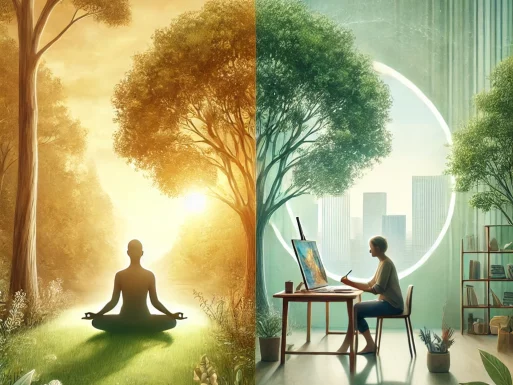Living a Balanced Lifestyle: The Art of Doing and Being
In our fast-paced world, we are continually engaged in activities, whether on our own or in a group setting, for work, learning, or fun. This constant engagement in various tasks often gives us a sense of purpose and achievement. After all, nothing would be achieved if we did just that—nothing. However, it is crucial to understand that a balanced lifestyle is not just about doing; it’s equally about being.
The Illusion of Doing Nothing
Sometimes, it may appear as if we are not doing anything. But even in those moments of stillness, we are often engaged in some form of thinking. Consciously or unconsciously, our minds are always at work—imagining scenes, attaching to thoughts, or simply daydreaming. This kind of mental activity might not produce tangible results like a finished project or a ticked-off to-do list, but it is still a form of doing. Our thoughts keep us occupied, even when our bodies are at rest.
The Importance of Rest
Contrary to popular belief, doing nothing can actually be quite useful. The most obvious reason is that we need rest, and rest is not limited to just sleep. Our bodies and minds require downtime to recharge, process information, and maintain overall well-being. Without adequate rest, we run the risk of burnout, stress, and a host of other health problems. Rest allows our bodies to repair and our minds to refresh, making us more productive and creative when we return to our tasks.
The Power of Just Being
But rest is not just about physical recuperation; it’s also about emotional and mental restoration. Doing nothing—or more precisely, just being—is an essential part of life that is often overlooked. In moments of stillness, we develop a greater awareness of ourselves and our surroundings. This awareness allows us to raise our state of consciousness, making us less reactive and more intentional in our actions.
When we take the time to simply be, we connect with our true selves. We move beyond the labels and roles that define us in society and reconnect with the core of who we are—conscious beings having human experiences. This connection is essential for personal growth and making positive changes not only for ourselves but also for others and the world around us.
Finding Balance
Balancing doing and being is key to a fulfilling life. While it’s important to engage in activities that provide purpose and direction, it’s equally important to carve out time for stillness and self-reflection. This balance helps us to live more mindfully, make better decisions, and foster deeper connections with ourselves and others.
Practical Tips for Balancing Doing and Being:
- Schedule Downtime: Just as you would schedule meetings or tasks, make it a point to schedule time for rest and relaxation. This could be a daily meditation practice, a leisurely walk in nature, or simply sitting in silence for a few minutes each day.
- Practice Mindfulness: Bring your attention to the present moment, whether you’re engaged in an activity or resting. Mindfulness helps you to become more aware of your thoughts, feelings, and surroundings, leading to a more balanced and centred way of living.
- Set Boundaries: Learn to say no to activities that drain your energy or do not align with your values. Setting boundaries ensures that you have enough time and energy for the things that truly matter.
- Reflect Regularly: Take time to reflect on your day, your goals, and your overall well-being. Reflection helps you to stay aligned with your values and make adjustments as needed. Journalling can be an effective way to get things off one’s chest and reflect.
- Embrace the Art of Doing Nothing: Don’t feel guilty for taking time off or doing nothing. Remember, it’s not about being lazy; it’s about allowing yourself the space to recharge and reconnect.
Being Conscious While Doing
Incorporating the state of being, or remaining conscious, while engaging in various activities is a key aspect of living a balanced life. Often, we go through our daily routines on autopilot, completing tasks out of habit without fully engaging with them. However, when we bring a sense of awareness and presence into what we are doing, the experience becomes richer and more meaningful. Being conscious while doing means paying attention to our thoughts, feelings, and actions as they unfold. It’s about being fully present in each moment, whether we're working, spending time with loved ones, or even performing mundane chores. This heightened awareness not only enhances the quality of our experiences but also allows us to respond thoughtfully rather than react impulsively. By being conscious while doing, we cultivate a deeper connection with ourselves and the world around us, turning even the simplest actions into opportunities for growth and self-discovery.
Conclusion
In a world that constantly glorifies busyness and productivity, it's easy to lose sight of the importance of balance. By embracing both doing and being, or action and stillness, we can live more fulfilling, conscious lives. It’s not just about what we achieve, but also about how we experience each moment. So, take a step back, breathe, and remember that sometimes, doing nothing is the most productive thing you can do.


